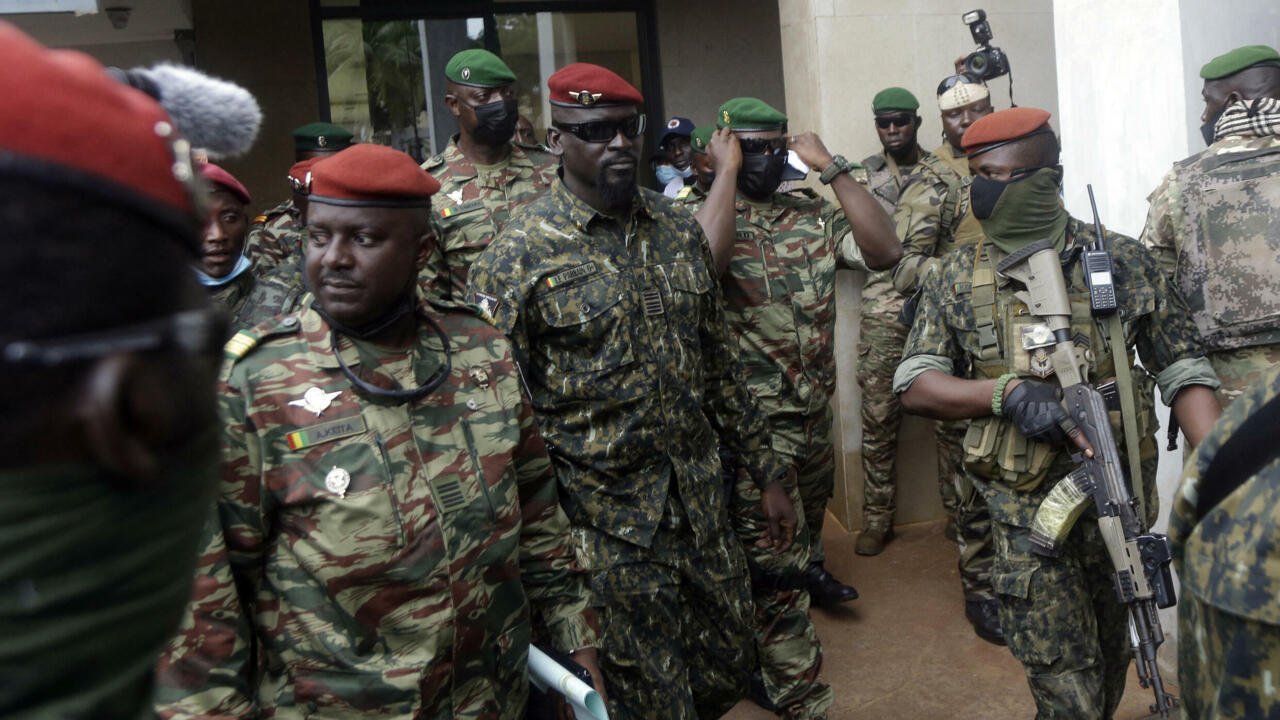Coups d'état in West Africa: a redistribution of political cards
Colonel Doumbouya, at the head of the putschists who led the coup d'état in Guinea, after a meeting with a delegation from ECOWAS, on September 10, 2021, in Conakry.
© AP - Sunday Alamba
Text by: Guillaume Thibault
4 min
What are the political consequences and the sub-regional impacts of the 2021 coups d'état in West Africa?
Mali, Guinea Conakry and Chad are at the heart of complex political transitions, under pressure from regional institutions which also seek to maintain control.
Advertising
Read more
West Africa has always been marked by regime overthrow, but this year we have seen the emergence of two "families" of coups d'état, a distinction which has only accentuated political tensions in the suburbs. -region.
With or without weapons: that is, schematically, the distinction made by states and institutions.
On the one hand, we observe the acceptance of an institutional coup, with the maintenance in power of a lineage, like that of the family of the late Idriss Déby Itno in Chad. On the other, the rejection of military coups, as
in Mali in August 2020
then last May
and in Guinea at the beginning of September.
At the beginning of December, during
the Dakar peace and security summit
, President Macky Sall, as the French head of state Emmanuel Macron had done before him, made this distinction again, citing only Mali and Guinea:
“In West Africa, we have two countries that have been hit, Mali and Guinea.
We cannot allow the military to take power by force.
We are in a democracy, power is won through elections.
"
Residents applaud army soldiers as they celebrate the uprising in Conakry, Guinea, September 5, 2021. © REUTERS / Souleymane Camara
Even if Macky Sall and his counterparts do not recognize it, these coups d'état in Chad, Mali and Guinea are above all the consequence of political excesses: the desire to remain in power, the State in the service of a clan or even violations. human rights...
For Alioune Tine, former head of Amnesty International in West Africa and founder of the think tank, AfrikaJom Center, the putschs have multiplied because the ECOWAS is weakened by these repeated excesses of the leaders.
“
Coups d'etat are the consequence of serious dysfunctions and in reality, the coup d'etat comes as a kind of therapy but it is a false therapy.
This reveals one thing, it is the collapse of the mechanisms for regulating political tensions at ECOWAS.
ECOWAS has practically collapsed, leadership is provided by countries which are not democratic.
Politics no longer makes sense and when the soldiers arrive, people applaud,
”he explains.
From political elite to military elite
Common to these putsch, the leaders of the political transitions are high-ranking army officers who refuse to submit. Mahamat Idriss Deby Itno in Chad was responsible for the security of the presidential palace. Assimi Goïta in Mali and Mamadi Doumbouya in Guinea were both leaders of the special forces. Three self-proclaimed presidents leaders who made the strategic choice to dissolve the institutions, effectively blocking any backtracking.
Weakness of local institutions, loss of influence of France, weakness also of ECOWAS and the African Union, all these elements allowed these soldiers to impose themselves day after day, estimates Ibrahima Kane, observer and Senegalese activist of the human rights. “
We are in societies which are in total decomposition. There are no longer any structures capable of playing the role that civil society played in the past. And that allows these soldiers to surf, to develop strategies, to go in directions which are theirs and which are not those of the population. Today, apart from these soldiers, there is absolutely nothing,
”he analyzes.
CNSP Malian army soldiers at a demonstration celebrating the coup at Independence Square in Bamako, Mali, August 21, 2020. REUTERS / Mamadou Keita
Alioune Tine goes in the same direction.
He believes that these repeated coups d'état in 2021, with transitional leaders who refuse to respect constitutional codes, in particular the timetables for organizing elections, are one of the signs, and also a direct consequence, of democratic systems at the end of their rope. blowing in West Africa.
“
We are still living one of the darkest postcolonial historical periods in the Cédéao space.
And it seems to me that we need to rethink democracies in West Africa, rethink governance and rethink geopolitics,
”he said.
At the beginning of January
,
Macky Sall will take the head of the African Union.
Very critical of these putschs, it will be interesting to see if the Senegalese president, who for his part refuses to say whether or not he will be a candidate for a third term, will push or force the leaders of the transitions in Mali and Guinea, but also of Chad, to organize the presidential elections as soon as possible.
► Also to listen: Alioune Tine: "In Africa, military coups, symptoms of democratic dysfunction"
Newsletter
Receive all international news directly in your mailbox
I subscribe
Follow all the international news by downloading the RFI application
google-play-badge_FR
Mali
Guinea

